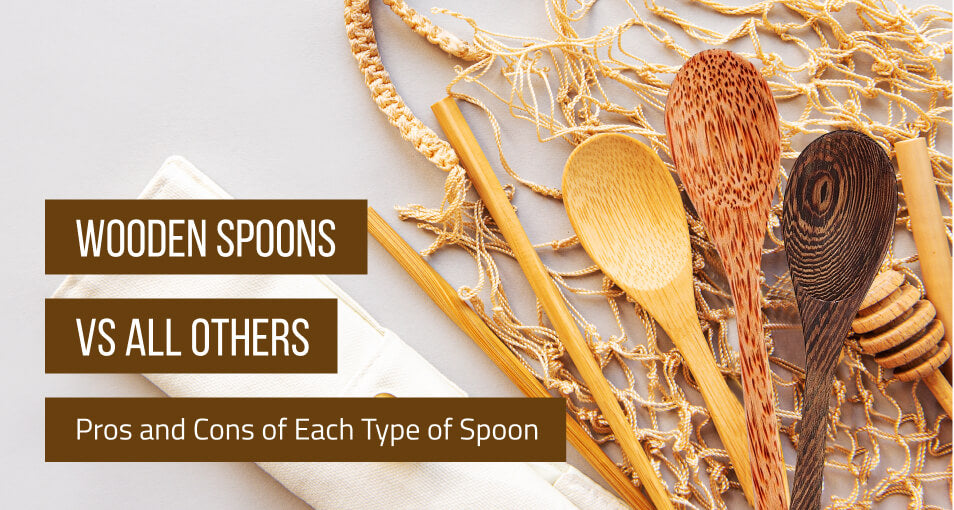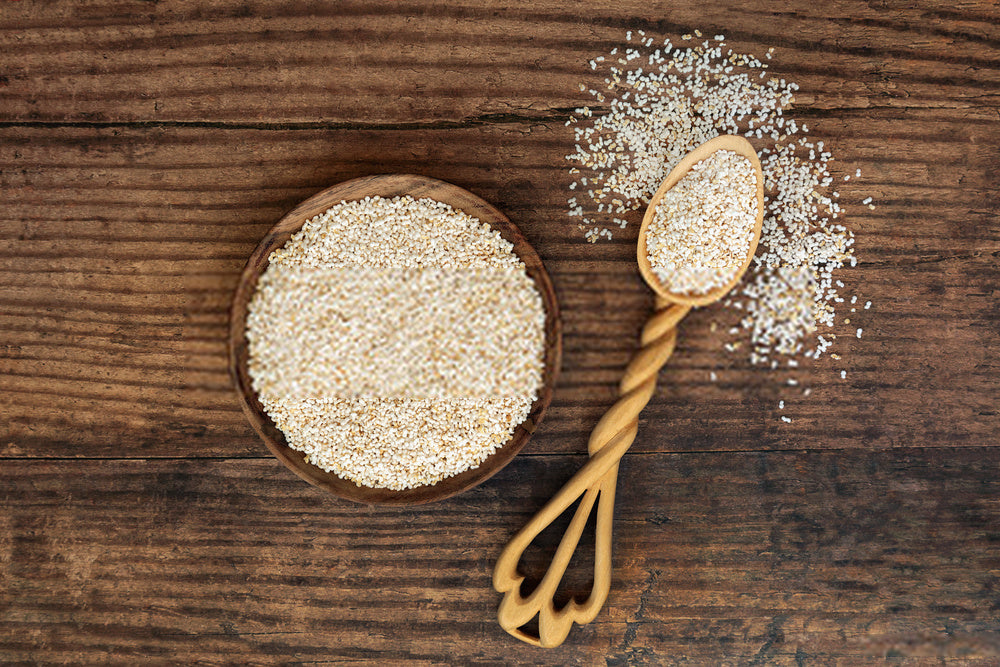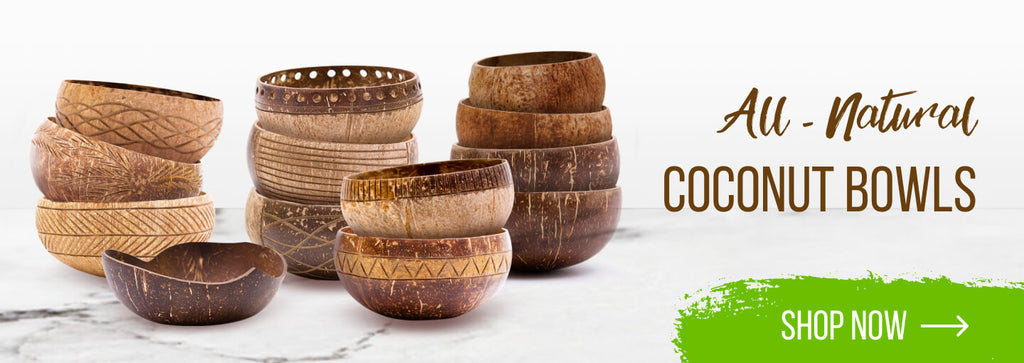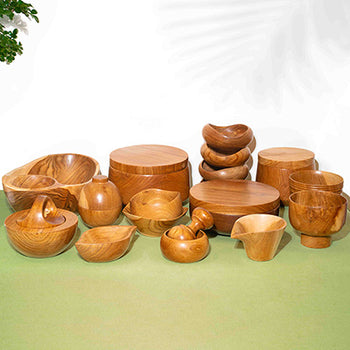
Wooden Spoons vs All Others: Pros and Cons of Each Type of Spoon
Over the centuries of human existence, eating has evolved from a basic necessity to a kind of art. People enjoy eating not only because it’s needed for survival but also because of the wonderful sensations it brings to our taste buds.
Culinary arts has indeed transformed from a simple craft into a field of study. Be that as it may, there persists a utensil for eating that dates as far back as the Old Stone Age: a wooden spoon.
All About Wooden Spoons
Wooden spoons are the first-ever types of spoons for eating that continue to be used by humankind up until the present. In fact, the word “spoon” derives from the Old English word that means a chip or splinter of wood.
Compared to spoons made of ivory, bones, slates, and silver, wooden spoons are inexpensive and easy to carve. Thus, they have been widely present in households throughout history.
Watch how our wooden spoons are made in this video:
But wooden spoons aren’t mainly used for eating. In Wales, a lovespoon or a wooden spoon with intricately carved patterns was a traditional sign of affection, and it was given as a token of romantic intent. This tradition brought about the term “spooning.”

Aside from this, this type of spoon presents different meanings and symbolism to various cultures across the globe. For instance, in the 18th century, wooden spoons served as booby prizes for students with the lowest exam marks and for athletes and sports teams finishing last in competitions.
Another proof of their special cultural value is that wooden spoons were found in ancient Egyptian tombs. This means that ancient Egyptians believed these utensils were still useful in the afterlife.
Today, they mostly serve as cooking tools, particularly for mixing ingredients and creaming.
In the present age when people pursue anything cheap and convenient, wooden spoons are often overlooked in favor of plastic and metal spoons, among others. But are the other more modern types of spoons better than traditional wooden spoons? Let’s look into the advantages and disadvantages of the common kinds of spoons today.
Kinds of Spoons
Spoons come in a variety of sizes, shapes, and materials. There are teaspoons, soup spoons, dessert spoons, serving spoons, and even egg spoons. In this article, we’ll focus more on spoons used for eating in general, their different materials, and their pros and cons.
Stainless Steel: Most Popular Spoon
The most common type of spoon is one that’s made of stainless steel. In fact, you probably have a set of stainless steel spoons in your kitchen right now.
Stainless steel spoons are rust-resistant, stain-resistant, and durable enough for daily use. Plus, they sport a polished finish and are dishwasher-safe, making them easy to clean and maintain. Because of this, stainless steel spoons are ideal for both eating and cooking.
While they’re predominantly used in modern homes and restaurants, stainless steel spoons still do have a few disadvantages.

One of their drawbacks is that they tend to score or scratch the delicate surfaces of nonstick pots and pans and certain types of dishes. Because of their hard edges, these spoons might not be the best option of utensils to use with expensive dishware. Additionally, some stainless steel spoons tend to be pricier than other kinds of spoons.
Stainless steel spoons are made of metal, and metal is a good thermal conductor. That means they can absorb the heat from food and might slightly burn your hand, especially if you’re not careful. Moreover, some metal spoons can leave a faint metallic taste in food, which can turn your dining experience into an unpleasant one.
Copper: Style Isn’t Worth It
Copper might not be the most common kind of spoon people use today, but some households do have copper spoons in their kitchens for cooking and eating.
Like stainless steel, copper is considered a metal. But unlike stainless steel, copper presents a great number of disadvantages when it is used as a material for spoons.

Copper spoons smell metallic and taste metallic. They strongly react with food, and they can get damaged when used with highly acidic food. Plus, they can make meals taste bitter and utterly foul.
Since copper spoons are made of metal, they can also scratch your dishware and cookware. Save for the fact that they offer a cool vintage look, there are virtually zero reasons why you should eat with copper spoons
Silicone: Great for Toddlers
Often used for feeding babies, silicone spoons are made of a food-grade, rubber-like material, which makes them soft and safe to use. Since they’re stain-resistant, non-corrosive, and dishwasher-friendly, these spoons are easy to clean. Plus, they can withstand extreme heat, which means they will neither get damaged easily nor conduct heat.

Because silicone spoons are soft, they won’t scratch your pots, pans, and dishware, unlike metal spoons. When you bite down on silicone spoons too hard, there’s no risk of your teeth cracking.
But because silicone spoons are soft and ideal for babies, they might not be the best choice of spoons for adults. Unless you want that weird, rubbery texture of silicone in your mouth as you eat, then, by all means, go for a silicone spoon. If you do opt for silicone spoons, avoid getting low-quality ones, which can retain odors, get damaged easily, and contain BPA.
Porcelain: Looks and Is Delicate
Porcelain or ceramic spoons are often used for serving food, scooping up sugar, or eating soup. There’s no question that they do look attractive and classy. Plus, they don’t conduct as much heat as metal spoons do.

The problem with porcelain spoons is that they seem delicate and are delicate. That means they’re expensive and pretty fragile as well.
Since they might break too easily and quickly, they aren’t ideal for regular use. They are, however, great for special occasions.
Plastic: Harmful for the Environment
Plastic spoons are a popular option of utensils in picnics and other events when having disposable spoons is more convenient. Some plastic spoons are more heavy-duty than others, which makes them reusable.
Despite this, plastic spoons, even those that are made to be reused, have short lifespans. Although they are meant to be used for only a short amount of time, plastic spoons persist in landfills for hundreds of years. These spoons, among other plastic products, have been causing quite a lot of environmental problems.

Apart from this, plastic spoons can retain oil and stains, so they’re pretty difficult to wash. That means they aren’t as reusable as advertised.
When they’re exposed to heat, they can melt and leach toxic chemicals into your food. In addition, they aren’t ideal for feeding children. When people, including children, bite down too hard on plastic spoons, chances are these spoons will break and might cut their mouths.
Bamboo: Bringing Sustainability to Spoons
Besides plastic, there’s another type of spoon that is disposable but is far more eco-friendly: bamboo. Bamboo spoons are not that commonly used in homes across the globe, but they are increasing in popularity for many reasons.
Bamboo spoons are durable, which means they’re easily reusable. Since they’re made from natural bamboo, they are biodegradable, compostable, and good for the environment overall.
When reusable bamboo utensils have to be thrown away, they can break down into organic particles as healthy compost for the soil—as long as they’re properly discarded, of course. Plus, they don’t conduct heat, and they are simply attractive. So if you’re looking for an alternative to single-use plastic spoons, disposable bamboo spoons are your best bet.
Wooden Spoons: Pros and Cons
Wooden spoons mainly offer three things: practicality, durability, and rich history. Many people are hesitant to use wooden spoons for various reasons, one of which is that wood isn’t a sustainable material.
Compared to other types of spoons, however, wooden spoons are made of a renewable and biodegradable source of materials. Moreover, the wooden utensils here on Rainforest Bowls are made of offcuts of coconut wood, bamboo, or scrap ebony wood. We even have coconut spoons with bowls made of reclaimed coconut shells and handles carved from scrap coconut wood.
But before you go ahead and get wooden spoons for your kitchen, read on and find out the advantages and disadvantages of using these pieces of cutlery.
Pros
1. Durable
Wooden spoons are made of a durable material that’s often used for building structures, furniture, and other objects. That said, these spoons can withstand daily use and can even last for a lifetime, as long as they’re properly cared for. Even if you use a wooden spoon for stirring thick ingredients, soup, or drinks, you won’t have to worry about breaking it.
2. Gentle
As opposed to metal spoons, wooden spoons won’t score your pots, pans, bowls, or plates. They’re gentle on delicate surfaces, and they don’t produce that annoying, skin-crawling sound that metal utensils make. Wooden spoons are perfect for people who want their dishes to remain scratch-free.

Pair your wooden spoons with the perfect eco-friendly bowls: coconut bowls. Handcrafted from reclaimed coconut shells, these all-natural bowls suit your all-natural wooden utensils!
3. Non-Conductive
Unlike plastic and metal spoons, wooden spoons are not good thermal conductors. That means there won’t be a problem holding these spoons whenever you eat frozen or extremely hot food. That also means you won’t have to be concerned about melting your spoon or burning your hand if you leave it in extremely hot meals for a long time.
4. No Metallic Taste
Wooden utensils won’t react with highly acidic food like what metal utensils do. They also won’t leave that unpleasant metallic taste and make your meals taste unappetizing. As a result, you can enjoy your food without tasting metal when you use a wooden spoon.
5. Retain Flavors
Some chefs believe that wooden spoons add a dash of wonderful flavors to dishes. It’s most likely because these spoons can retain flavors at times. In other words, the flavors of meals sometimes become part of wooden spoons.

Perhaps this explains why these pieces of cutlery bring about an inexplicably nostalgic, cozy feeling and a taste of home with every bite.
6. Zero Chemicals
Wooden spoons consist of all-natural materials. Also, making these spoons doesn’t require the use of artificial substances or chemicals. That’s why you won’t need to worry about toxic chemicals leaching into your food with these utensils.
7. Style
Even if you’re not a huge fan of wooden utensils, you have to admit that they do look stylish. Because of their beautiful wood grain, these spoons offer that elegance combined with a classic style that no other spoon possesses.
Wooden spoons can seamlessly blend in your kitchen—be it a traditional kitchen or a modern one. Plus, their timeless style can add a sort of magical yet familiar feeling to every meal.
8. Comfortable Grip
Apart from the fact that wooden spoons don’t conduct heat or cold, they’re comfortable to grip because of their slightly rounded handles. Holding metal spoons, especially for a long time, tends to be uncomfortable.
Metal spoons feel rather cold to the touch, while plastic spoons are just plain dull. Wooden spoons, on the other hand, mold into your hands, feel comfortable to hold, and seem to possess a unique personality.
9. Eco-Friendly
Metal spoons are made of non-renewable sources of materials, whereas plastic spoons consist of artificial chemicals and are harmful to the environment. These spoons, along with ceramic, porcelain, and silicone spoons, are neither biodegradable nor compostable. Compared to wooden spoons, these types of spoons are significantly less eco-friendly.
Wooden spoons are made of an all-natural, biodegradable material, which means they can decompose over time without releasing toxic substances to the environment. As was previously mentioned, some spoons like what we offer here on Rainforest Bowls are crafted from scrap ebony, coconut wood, and bamboo offcuts.
Our eco-friendly wooden utensils are a great way of repurposing discarded materials—perfect for environmentally-conscious individuals and businesses alike.
Cons
1. Stains
When used in sauces and soups, wooden spoons tend to retain stains. That’s why many people worry about these spoons harboring bacteria and contaminating food. But as with all other types of spoons, wooden ones will be a breeding ground for bacteria when they aren’t thoroughly cleaned. Cleaning wooden spoons after every use will also prevent them from retaining stains.
2. Hard to Clean
Since wooden spoons have a more porous surface than other types of spoons, food particles tend to cling to these spoons’ surfaces. Also, wooden spoons can’t be used in dishwashers, and they can’t be soaked in water for a long time. Some people might find it more difficult to clean wooden spoons than their metal or ceramic counterparts.
3. Prone to Wearing and Cracking
Over time, the wood finish of wooden spoons can wear off, especially with regular use. Aside from this, there’s a possibility that a wooden spoon can crack or even break in half, despite its durability. But with proper care and handling, these problems can be easily prevented.
Just remember to hand-wash your spoons with warm water and soap and dry them immediately after washing. Always keep in mind that you should never wash them in a dishwasher.

To prevent your wooden spoon’s finish from drying or wearing, spread a bit of coconut oil or food-grade mineral oil all over your spoon, leave it overnight, and remove the excess oil. Do this every month to keep your spoon in pristine condition. For added durability, you can also apply hempseed oil, linseed oil, or walnut oil to your spoon’s surface.
A Spoonful of Advice About Choosing Spoons
Choosing the right spoons might seem like an unimportant decision, but on the contrary, it can influence your gustatory experience. Spoons enter our mouths, so they do affect the way we enjoy our meals.

When it comes to choosing the best spoons for eating, it all boils down to your needs and preferences. If you prefer a touch of class to every meal, use an elegant-looking porcelain spoon or even a silver spoon. If you’d like to have a set of utensils that’s durable and easy to clean, then you might want to opt for stainless steel spoons, which you might already have in your kitchen. If you want disposable utensils, choose bamboo spoons and avoid getting toxic plastic spoons at all costs.
Wooden spoons are durable, long-lasting, and comfortable to use. They also won’t leave scratches on your dishes, and they even sport a classic style that’s simply beautiful. Plus, the wooden coconut spoons, ebony spoons, and bamboo spoons here on Rainforest Bowls are biodegradable, all-natural, and sustainably made of scrap coconut wood, reclaimed ebony wood, and bamboo.
They’re some of the most eco-friendly utensils out there! And because they’re made of natural wood, they’re a perfect match for our coconut bowls.
With our handmade wooden spoons, along with wooden forks and cooking utensils, you can enjoy meals with a sense of familiarity, nostalgia, and home.










